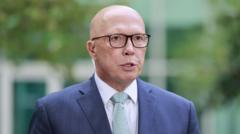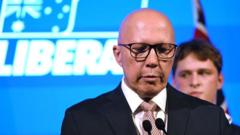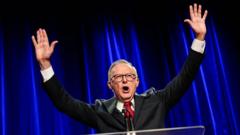In a surprising turn of events, Australia's opposition leader Peter Dutton has retracted a contentious election pledge to eliminate work-from-home arrangements for public servants, acknowledging the backlash it has drawn from voters.
Australia's Opposition Leader Reverses Work-from-Home Decision Amid Backlash

Australia's Opposition Leader Reverses Work-from-Home Decision Amid Backlash
Peter Dutton apologizes for controversial election promise to end remote work options for public servants.
Peter Dutton's Liberal-National Coalition faced significant criticism for the proposal, which aimed to enhance public sector efficiency but was perceived as harmful, particularly to women's employment. On Monday, Dutton apologized publicly, admitting the policy was a mistake. The Coalition is gearing up for the upcoming election on May 3 and had bundled this policy with plans for significant job cuts in the public sector.
During a press conference, Dutton clarified that the policy was intended to affect only public service workers in Canberra. He accused the incumbent Labor government of misrepresenting the proposal in a "smear campaign." Shadow finance minister Jane Hume echoed this sentiment, stating that the party would no longer push for changes to flexible work arrangements, confirming that working from home is essential for workforce efficiency.
In addition, the Coalition reiterated its plan to cut 41,000 public service jobs but detailed a more cautious approach. Hume indicated that any reduction would be managed over a five-year period through hiring freezes and natural attrition, distancing the party from previous suggestions of forced layoffs. This clarification seemed to contradict Dutton's earlier statements, prompting further confusion.
Labor government officials seized the opportunity to criticize Dutton's shifting stance, with Employment Minister Murray Watt calling it a sign of weakness and inconsistency. As other nations push for stricter office attendance policies, like US President Donald Trump's executive order to return employees to the office, the proposed changes in Australia have met with public disapproval. Opinion polls indicate that many Australians prioritize tackling the cost of living over workplace flexibility issues, emphasizing the need for the Coalition to reassess its strategies as they head into the election.
During a press conference, Dutton clarified that the policy was intended to affect only public service workers in Canberra. He accused the incumbent Labor government of misrepresenting the proposal in a "smear campaign." Shadow finance minister Jane Hume echoed this sentiment, stating that the party would no longer push for changes to flexible work arrangements, confirming that working from home is essential for workforce efficiency.
In addition, the Coalition reiterated its plan to cut 41,000 public service jobs but detailed a more cautious approach. Hume indicated that any reduction would be managed over a five-year period through hiring freezes and natural attrition, distancing the party from previous suggestions of forced layoffs. This clarification seemed to contradict Dutton's earlier statements, prompting further confusion.
Labor government officials seized the opportunity to criticize Dutton's shifting stance, with Employment Minister Murray Watt calling it a sign of weakness and inconsistency. As other nations push for stricter office attendance policies, like US President Donald Trump's executive order to return employees to the office, the proposed changes in Australia have met with public disapproval. Opinion polls indicate that many Australians prioritize tackling the cost of living over workplace flexibility issues, emphasizing the need for the Coalition to reassess its strategies as they head into the election.



















